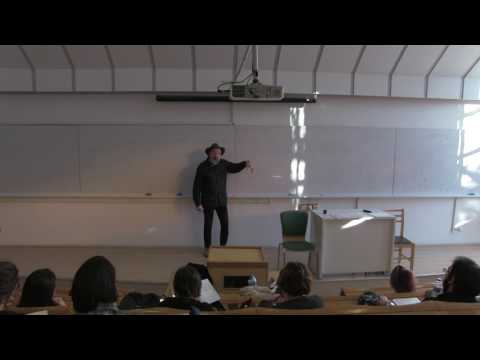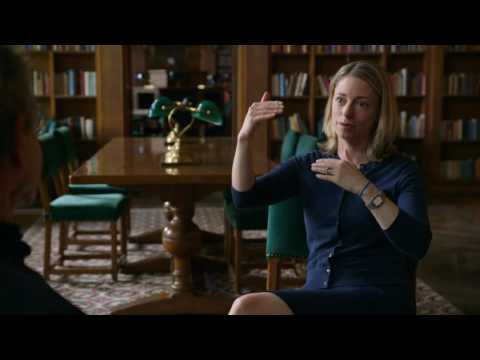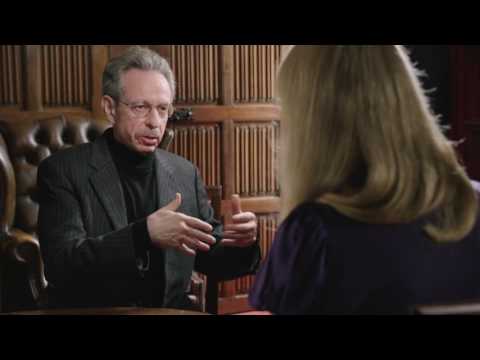# click the up-left corner to select videos from the playlist
source: Open Education Edinburgh 2014年5月23日
Introduction to Philosophy (free online course)
Philosophy at the University of Edinburgh
Videos from our free online course available on Coursera
https://www.coursera.org/learn/philosophy/
0.0. INTROPHIL - Introduction 1:40
1.1. INTROPHIL - What is Philosophy? 12:31
1.2. INTROPHIL - Philosophy: Difficult, Important and Everywhere 11:04
1.3. INTROPHIL - Philosophy: How do we do it? 17:05
2.1. INTROPHIL - The Basic Constituents of Knowledge 13:11
2.2. INTROPHIL - The Classical Account of Knowledge and the Gettier Problem 18:38
2.3. INTROPHIL - Do We Have Any Knowledge? 10:36
3.1. INTROPHIL - Descartes Substance Dualism Theory of the Mind 11:17
3.2. INTROPHIL - Physicalism Identity Theory and Functionalism 13:24
3.3. INTROPHIL - Functionalism and What Mental States Do 8:41
3.4. INTROPHIL - Functionalism and Functional Complexity 4:12
4.1. INTROPHIL - The Status of Morality 13:28
4.2. INTROPHIL - Objectivism, Relativism and Emotivism 13:25
4.3. INTROPHIL - Objections to Objectivism, Relativism and Emotivism 11:24
5.1. INTROPHIL - Introduction: Hume on Testimony and Miracles 8:49
5.2. INTROPHIL - Reids Challenge to Hume 2:14
5.3. INTROPHIL - Reid's Argument 5:40
5.4. INTROPHIL - Kant the Enlightenment and Intellectual Autonomy 4:17
6.1. INTROPHIL - The Aim of Science Saving the Phenomena vs Truth 2:31
6.2. INTROPHIL - Saving the Phenomena Ptolemeic Astronomy 5:15
6.3. INTROPHIL - Truth? Galileo and Copernican Astronomy 2:06
6.4. INTROPHIL - Scientific Realism and the No Miracles Argument 3:32
6.5. INTROPHIL - Scientific Anti Realism Constructive Empiricism 7:27
6.6. INTROPHIL - Realist Rejoinders Inference to the Best Explanation 5:51
6.7. INTROPHIL - Concluding Summary 2:07
7.1. INTROPHIL Time Travel 1: What Might Time Travel Be Anyway? 7:19
7.2. INTROPHIL Time Travel 2: Grandfather Paradoxes 9:15
7.3. INTROPHIL Time Travel 3: Two Senses of Change 7:24
7.4. INTROPHIL Time Travel 4: Causal Loops 7:45
7.5. INTROPHIL Time Travel 5: Where Next? 8:54
1. Clicking ▼&► to (un)fold the tree menu may facilitate locating what you want to find. 2. Videos embedded here do not necessarily represent my viewpoints or preferences. 3. This is just one of my several websites. Please click the category-tags below these two lines to go to each independent website.
2017-01-24
English Legal System Lectures by Hazel Genn & Adam Gearey (University of London)
# click the up-left corner to select videos from the playlist
source: UOLIAulp 2013年6月25日
Lecture 1 Part 1 : What is law? 10:16 Dame Hazel Genn discusses the nature of law and the sources of English Law.
Lecture 1 Part 2 : What is the Common Law? 25:41
Lecture 2 Part 1 : Introduction to the Civil and Criminal Courts 7:49 Professor Adam Gearey introduces the court system used in Wales and England.
Lecture 2 Part 2 : The Civil Courts 5:39
Lecture 2 Part 3 : The Criminal Courts 2:57
Lecture 2 Part 4 : The Supreme Court and the European Courts 7:38
Lecture 2 Part 5 : The Relationship of the Hierarchy of the courts to the Doctrine of Precedent 8:26
Lecture 2 Part 6 : Common Law and Equity 19:02
Lecture 2 Part 7 : A contemporary view of Common Law and Equity 19:40
Lecture 3 Part 1 : Introduction to The Doctrine of Parliamentary Sovereignty 9:57
Lecture 3 Part 2 : The Rise of Statute Law 11:11
Lecture 3 Part 3 : Legal and Parliamentary Sovereignty 9:31
Lecture 3 Part 4 : The European Union and Parliamentary Sovereignty 10:24
Lecture 3 Part 5 : The Human Rights Act and Parliamentary Sovereignty 11:30
Lecture 3 Part 6 : Contemporary Reality of Parliamentary Sovereignty: Judges, Parliament and the HRA 16:57
Lecture 4 Part 1 : Overview of Judicial Precedent 9:50
Lecture 4 Part 2 : Judicial precedent and the role of the Judges 8:16
Lecture 4 Part 3 : Modern Practice of the House of Lords 12:25
Lecture 4 Part 4 : Decisions of the Court of Appeal 7:44
Lecture 4 Part 5 : Decisions of the Court of Appeal: Further Developments 9:30
Lecture 4 Part 6 : Judicial Law Making 7:23
Lecture 4 Part 7 : Judicial Law Making and the Human Rights Act 6:16
Lecture 4 Part 8 : The Doctrine of Precedent and the European Court of Human Rights 5:22
Lecture 5 Part 1 : Challenges of Statutory Interpretation 9:32
Lecture 5 Part 2 : The Nature of Statutory Interpretation 9:20
Lecture 5 Part 3 : The Presumptions of Statutory interpretation 4:05
Lecture 5 Part 4 : The importance of Pepper v Hart 10:10
Lecture 5 Part 5 : The Effect of Bulmer v Bollinger 7:40
Lecture 5 Part 6 : New Methods of interpretation: Some Case Law 10:14
Lecture 5 Part 7 : Purposive Interpretation Outside of the European Court 5:25
Lecture 5 Part 8 : Statutory Interpretation and the Human Rights Act 10:45
Lecture 6 Part 1 : EU Treaties and ECHR (13:41) 13:42
Lecture 6 Part 2 : Links between the present and past of the EU (4:57) 4:57
Lecture 6 Part 3 : Foundational Values (4:30) 4:31
Lecture 6 Part 4 : The Institutions of the EU (4:25) 4:25
Lecture 6 Part 5 : EU Law (5:28) 5:29
Lecture 6 Part 6 : EU Convention of Human Rights (13:34) 13:35
Lecture 6 Part 7 : Rights Contained in the European Convention (13:34) 13:35
Lecture 6 Part 8 : Rights Contained within the European Convention (5:59) 6:00
source: UOLIAulp 2013年6月25日
Lecture 1 Part 1 : What is law? 10:16 Dame Hazel Genn discusses the nature of law and the sources of English Law.
Lecture 1 Part 2 : What is the Common Law? 25:41
Lecture 2 Part 1 : Introduction to the Civil and Criminal Courts 7:49 Professor Adam Gearey introduces the court system used in Wales and England.
Lecture 2 Part 2 : The Civil Courts 5:39
Lecture 2 Part 3 : The Criminal Courts 2:57
Lecture 2 Part 4 : The Supreme Court and the European Courts 7:38
Lecture 2 Part 5 : The Relationship of the Hierarchy of the courts to the Doctrine of Precedent 8:26
Lecture 2 Part 6 : Common Law and Equity 19:02
Lecture 2 Part 7 : A contemporary view of Common Law and Equity 19:40
Lecture 3 Part 1 : Introduction to The Doctrine of Parliamentary Sovereignty 9:57
Lecture 3 Part 2 : The Rise of Statute Law 11:11
Lecture 3 Part 3 : Legal and Parliamentary Sovereignty 9:31
Lecture 3 Part 4 : The European Union and Parliamentary Sovereignty 10:24
Lecture 3 Part 5 : The Human Rights Act and Parliamentary Sovereignty 11:30
Lecture 3 Part 6 : Contemporary Reality of Parliamentary Sovereignty: Judges, Parliament and the HRA 16:57
Lecture 4 Part 1 : Overview of Judicial Precedent 9:50
Lecture 4 Part 2 : Judicial precedent and the role of the Judges 8:16
Lecture 4 Part 3 : Modern Practice of the House of Lords 12:25
Lecture 4 Part 4 : Decisions of the Court of Appeal 7:44
Lecture 4 Part 5 : Decisions of the Court of Appeal: Further Developments 9:30
Lecture 4 Part 6 : Judicial Law Making 7:23
Lecture 4 Part 7 : Judicial Law Making and the Human Rights Act 6:16
Lecture 4 Part 8 : The Doctrine of Precedent and the European Court of Human Rights 5:22
Lecture 5 Part 1 : Challenges of Statutory Interpretation 9:32
Lecture 5 Part 2 : The Nature of Statutory Interpretation 9:20
Lecture 5 Part 3 : The Presumptions of Statutory interpretation 4:05
Lecture 5 Part 4 : The importance of Pepper v Hart 10:10
Lecture 5 Part 5 : The Effect of Bulmer v Bollinger 7:40
Lecture 5 Part 6 : New Methods of interpretation: Some Case Law 10:14
Lecture 5 Part 7 : Purposive Interpretation Outside of the European Court 5:25
Lecture 5 Part 8 : Statutory Interpretation and the Human Rights Act 10:45
Lecture 6 Part 1 : EU Treaties and ECHR (13:41) 13:42
Lecture 6 Part 2 : Links between the present and past of the EU (4:57) 4:57
Lecture 6 Part 3 : Foundational Values (4:30) 4:31
Lecture 6 Part 4 : The Institutions of the EU (4:25) 4:25
Lecture 6 Part 5 : EU Law (5:28) 5:29
Lecture 6 Part 6 : EU Convention of Human Rights (13:34) 13:35
Lecture 6 Part 7 : Rights Contained in the European Convention (13:34) 13:35
Lecture 6 Part 8 : Rights Contained within the European Convention (5:59) 6:00
The Brachistochrone
source: Vsauce 2017年1月21日
BRAIN CANDY LIVE TICKETS: http://www.braincandylive.com/tickets
Links to sources and to learn more below!
MY TWITTER: http://www.twitter.com/tweetsauce
MY INSTAGRAM: http://www.instagram.com/electricpants
THE CURIOSITY BOX: https://www.curiositybox.com/
Derrida (Contemporary Sociology Theory at METU) by Erdoğan Yıldırım
Contemporary Sociology Theory - WEEK 14 - Derrida
Instructor: Assoc. Prof. Erdoğan Yıldırım
For Lecture Notes: http://ocw.metu.edu.tr/course/view.php?id=249
 1:00:22 Derrida - Lecture 4
1:00:22 Derrida - Lecture 4
 41:59 Derrida - Lecture 3
41:59 Derrida - Lecture 3
 38:43 Derrida - Lecture 2
38:43 Derrida - Lecture 2
 49:25 Derrida - Lecture 1
49:25 Derrida - Lecture 1
Instructor: Assoc. Prof. Erdoğan Yıldırım
For Lecture Notes: http://ocw.metu.edu.tr/course/view.php?id=249
 1:00:22 Derrida - Lecture 4
1:00:22 Derrida - Lecture 4 41:59 Derrida - Lecture 3
41:59 Derrida - Lecture 3 38:43 Derrida - Lecture 2
38:43 Derrida - Lecture 2 49:25 Derrida - Lecture 1
49:25 Derrida - Lecture 1
Quantum Mechanics and Consciousness with Edwin C. May
source: New Thinking Allowed 2016年12月25日
Edwin C. May, PhD, was involved in the military intelligence psychic spying program, popularly referred to as Stargate, for over twenty years. During the last decade, he was the director of research for that program. In this context, he produced over a hundred scientific publications. His academic training was in experimental nuclear physics. He is coauthor of ESP Wars: East and West and also Anomalous Cognition: Remote Viewing Research and Theory. He is the coeditor of a two volume anthology titled Extrasensory Perception: Support, Skepticism, and Science.
Heidegger: The End of Philosophy and The Task of Thinking (English Subtitles)
source: Eidos84 2011年7月11日
"The End of Philosophy and The Task of Thinking", Heidegger's final monologue from the 1975 documentary "On the Way to Thinking". Heidegger discusses his contribution to a future "thinking" which will supercede traditional philosophy and metaphysics.
Finite Element method for vibration and Stability analyses by C. S. Manohar (IIS Bangalore)
# click the up-left corner to select videos from the playlist
source: nptelhrd 2016年10月3日
Civil Engineering - Finite Element method for vibration and Stability analyses
mod01lec01 51:33
mod01lec02 51:16
mod01lec03 56:15
mod02lec04 54:39
mod02lec05 53:42
mod02lec06 55:46
mod02lec07 57:06
mod03lec08 52:55
mod03lec09 55:35
mod03lec10 56:24
mod04lec11 50:25
mod04lec12 52:27
mod05lec13 51:03
mod05lec14 54:31
mod05lec15 51:04
mod05lec16 53:07
mod06lec17 51:00
mod06lec18 51:24
mod07lec19 48:27
mod07lec20 54:12
mod07lec21 48:09
mod07lec22 52:12
mod07lec23 50:43
mod07lec24 45:31
mod07lec25 46:45
mod08lec26 45:42
mod08lec27 51:38
mod08lec28 51:56
mod08lec29 51:59
mod08lec30 51:05
mod08lec31 52:45
mod08lec32 52:08
mod08lec33 52:32
mod08lec34 51:50
mod09lec35 54:44
mod09lec36 54:31
mod10lec37 52:58
mod10lec38 48:49
mod10lec39 48:48
mod10lec40 57:05
source: nptelhrd 2016年10月3日
Civil Engineering - Finite Element method for vibration and Stability analyses
mod01lec01 51:33
mod01lec02 51:16
mod01lec03 56:15
mod02lec04 54:39
mod02lec05 53:42
mod02lec06 55:46
mod02lec07 57:06
mod03lec08 52:55
mod03lec09 55:35
mod03lec10 56:24
mod04lec11 50:25
mod04lec12 52:27
mod05lec13 51:03
mod05lec14 54:31
mod05lec15 51:04
mod05lec16 53:07
mod06lec17 51:00
mod06lec18 51:24
mod07lec19 48:27
mod07lec20 54:12
mod07lec21 48:09
mod07lec22 52:12
mod07lec23 50:43
mod07lec24 45:31
mod07lec25 46:45
mod08lec26 45:42
mod08lec27 51:38
mod08lec28 51:56
mod08lec29 51:59
mod08lec30 51:05
mod08lec31 52:45
mod08lec32 52:08
mod08lec33 52:32
mod08lec34 51:50
mod09lec35 54:44
mod09lec36 54:31
mod10lec37 52:58
mod10lec38 48:49
mod10lec39 48:48
mod10lec40 57:05
Human Mind and Society (Closer to Rruth)
source: Closer To Truth
Society is composed of human minds working collectively. By appreciating consciousness can we understand society better? Conversely, by appreciating society can we understand consciousness better?
 5:30 Thalia Wheatley - Human Mind and Society
5:30 Thalia Wheatley - Human Mind and Society
 8:23 Roy Baumeister - Human Mind and Society
8:23 Roy Baumeister - Human Mind and Society
 11:32 Susan Greenfield - Human Mind and Society
11:32 Susan Greenfield - Human Mind and Society
Society is composed of human minds working collectively. By appreciating consciousness can we understand society better? Conversely, by appreciating society can we understand consciousness better?
 5:30 Thalia Wheatley - Human Mind and Society
5:30 Thalia Wheatley - Human Mind and Society 8:23 Roy Baumeister - Human Mind and Society
8:23 Roy Baumeister - Human Mind and Society 11:32 Susan Greenfield - Human Mind and Society
11:32 Susan Greenfield - Human Mind and Society
Timothy Snyder - "What Can European History Teach Us About Trump’s Ameri...
source: Yale University 2016年12月6日
This event talks about the historical realities of political ideology, and discuss the ramifications of the 2016 election. Professor Snyder is one of the leading experts on Eastern European history, and recently published a new book, Black Earth: The Holocaust as History and Warning, winner of the MacMillan Center’s Gustav Ranis International Book Prize. Professor Snyder will discuss recent presidential election and the state of European and American political history.
Sponsored by the Yale Political Union and the Whitney and Betty MacMillan Center for International and Area Studies.
Protecting People from the Ocean, and the Ocean from People || Radcliffe...
source: Harvard University 2016年12月9日
Protecting People from the Ocean and the Ocean from People:
Search and Rescue and Marine Environmental Protection/Response
The Coast Guard, the fifth branch of the US Armed Forces, is a multi-mission maritime agency. This talk reviews how the Coast Guard in Boston and throughout the nation seeks to strike the balance between maritime safety, security, and environmental protection amidst changing climate conditions, all while facilitating the powerful economic engine of maritime commerce.
Featuring
(3:08, 30:26) Claudia C. Gelzer, Captain, US Coast Guard
(9:37) Lee Titus, Commander, US Coast Guard
Introduction by John Huth, faculty codirector of the science program at the Radcliffe Institute and Donner Professor of Science in the Faculty of Arts and Sciences, Harvard University
Q&A (47:44)
Part of the 2016–2017 Oceans Lecture Series https://www.radcliffe.harvard.edu/eve...
2016 US-China Forum: A Moderated Dialogue with His Excellency He Yafei
source: The University of Chicago 2016年11月18日
In the first event of the 2016 U.S.–China Forum, His Excellency He Yafei, the Former Vice Minister of Foreign Affairs of the People's Republic of China, shares remarks on U.S.–China relations.
The US-China Forum is sponsored by the China-United States Exchange Foundation in collaboration with the University of Chicago. The annual forum brings together renowned experts—including faculty from the University of Chicago and scholars from China—for high-level engagement focused on issues of importance to both countries and, by extension, the world. It is intended to spur long-term research collaborations between Chinese and University of Chicago researchers.
Get inspired by a professor: Henrik Druid
source: karolinskainstitutet 2016年12月1日
How to tell why we die by Henrik Druid, Professor of Forensic Medicine at the Department of Oncology-Pathology, Karolinska Institutet. November 2016.
Emily Calandrelli: "Exploring Space to Inspire STEM Literacy" | Talks at...
source: Talks at Google 2016年12月20日
Emily Calandrelli, producer and the host of FOX’s Xploration Outer Space, TEDx speaker and space industry contributor to TechCrunch shares how her passion for space exploration is inspiring STEM literacy. Emily is an MIT alum where she completed dual degrees – a Masters in Aeronautics and Astronautics and a Masters in Technology in Policy. During her academic career, she was awarded the Goldwater Scholarship, the Truman Scholarship, and MIT’s Rene H. Miller Prize.
Husserl & Phenomenology
source: Philosophical Overdose 2016年12月21日
Robert Harrison and his guest Thomas Sheehan discuss Phenomenology, a philosophical movement and methodology which began in the early 20th century with Edmund Husserl. This is an episode of "Entitled Opinions" from Stanford University: http://french-italian.stanford.edu/op...
How to Ethically Analyze Reproductive Technologies | Glenn Cohen
source: Big Think 2016年12月15日
Harvard bioethicist Glenn Cohen knows in his gut that sex and sexual reproduction are areas of human life that involve moral dilemmas. But when it comes to resolving those dilemmas and taking action, he recognizes the need to "go beyond the gut."
Read more at BigThink.com: http://bigthink.com/videos/glenn-cohe...
Transcript - So, reproductive technology is sort of a family of technologies. We have in vitro fertilization where essentially an egg is being fertilized outside of the body. So that involves harvesting eggs from women and then implanting sperm into that and putting it in. There are some variations on that. Another very common form of productive technology is surrogacy. In surrogacy an embryo is being carried by a woman who is not the genetic mother of the child, so another woman is caring the egg and sperm combined into a fetus. And then we have a series of other brand new technologies like mitochondrial replacement therapy where you're taking the egg from one woman, you're removing the mitochondria from that egg and putting in the mitochondria from another egg to deal with mitochondrial disease and here there's an idea that there's actually three genetic parents: the genetic father who provides the sperm, there's the mitochondrial donor and there's the woman who donates the rest of the egg. So in reality there's three genetic parents, even though the mitochondrial donor is only giving a very small part of genetic material in the DNA. So those are three reproductive technologies. Two are very common. One is brand-new.
And, of course, the oldest one that we have is artificial insemination. And in fact this goes back to the 1800s I believe in the United States at least. And this is essentially when a man ejaculates his sperm and it's used to inseminate a woman typically through an injection, although the old things they say about turkey basters are actually true. You can do at home insemination with a turkey baster. So those are four technologies: artificial insemination, in vitro fertilization, surrogacy and mitochondrial replacement therapy. Read Full Transcript Here: https://goo.gl/711tDf.
Subscribe to:
Comments (Atom)